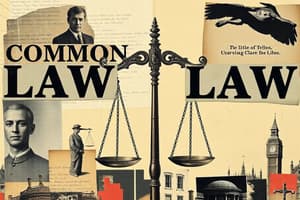Podcast
Questions and Answers
What must a solicitor do to obtain right of audience and advocacy in higher courts?
What must a solicitor do to obtain right of audience and advocacy in higher courts?
- Undertake a Higher Rights of Audience course and pass 3 assessments (correct)
- Work for a barrister for two years
- Complete a Law Society internship and pass an ethics exam
- Attend a judicial training program
How is the solicitor-client relationship characterized in Equity?
How is the solicitor-client relationship characterized in Equity?
- As an adversarial relationship
- As a fiduciary relationship based on good faith (correct)
- As an informal understanding with no legal implications
- As a transactional relationship defined by written contracts
What can happen if a solicitor breaches practice rules?
What can happen if a solicitor breaches practice rules?
- They may face criminal charges
- A prima facie allegation of misconduct may be initiated against them (correct)
- They may be sued for damages by their clients
- They lose their membership in the Bar Association
Which option describes the relationship between solicitors and barristers before the European Court of Justice?
Which option describes the relationship between solicitors and barristers before the European Court of Justice?
What type of lawyers may solicitors choose to specialize in?
What type of lawyers may solicitors choose to specialize in?
What is the primary role of barristers in the legal system?
What is the primary role of barristers in the legal system?
Which organization governs the education and training of barristers?
Which organization governs the education and training of barristers?
What is required for students to progress from the academic stage to the vocational stage in their training as barristers?
What is required for students to progress from the academic stage to the vocational stage in their training as barristers?
Which of the following terms relates to the violation of a legal obligation?
Which of the following terms relates to the violation of a legal obligation?
What is the role of the General Council of the Bar?
What is the role of the General Council of the Bar?
What type of relationships does the term 'fiduciary relationships' refer to?
What type of relationships does the term 'fiduciary relationships' refer to?
Which type of lawyer specializes in issues of tax law?
Which type of lawyer specializes in issues of tax law?
What is the purpose of a legal clinic?
What is the purpose of a legal clinic?
What was the primary effect of the Judicature Acts, 1873-1875?
What was the primary effect of the Judicature Acts, 1873-1875?
What is the doctrine of stare decisis?
What is the doctrine of stare decisis?
Which of the following statements about ratio decidendi is true?
Which of the following statements about ratio decidendi is true?
What are obiter dicta?
What are obiter dicta?
In what situation is a case referred to as a 'case of first impression'?
In what situation is a case referred to as a 'case of first impression'?
What distinguishes common law from civil law systems?
What distinguishes common law from civil law systems?
What must judges consider when dealing with cases that are of first impression?
What must judges consider when dealing with cases that are of first impression?
Which statement best describes the fusion of equity and common law?
Which statement best describes the fusion of equity and common law?
What is required for a barrister to take silk and become a King's Counsel?
What is required for a barrister to take silk and become a King's Counsel?
Which of the following is true about barristers' rights of audience?
Which of the following is true about barristers' rights of audience?
How has the Courts and Legal Services Act 1990 changed the barrister-client relationship?
How has the Courts and Legal Services Act 1990 changed the barrister-client relationship?
What are barristers entitled to receive for their preparation and the first day of trial?
What are barristers entitled to receive for their preparation and the first day of trial?
What percentage of barristers approximately hold the title of King's Counsel?
What percentage of barristers approximately hold the title of King's Counsel?
What is one condition under which barristers can be sued?
What is one condition under which barristers can be sued?
What signifies a barrister who has taken silk?
What signifies a barrister who has taken silk?
Which statement about King's Counsel is incorrect?
Which statement about King's Counsel is incorrect?
What is the purpose of the Bar Exam for law school graduates?
What is the purpose of the Bar Exam for law school graduates?
What must law graduates do if they wish to practice in a different state after passing the Bar Exam?
What must law graduates do if they wish to practice in a different state after passing the Bar Exam?
Which historical event contributed to the development of common law in England?
Which historical event contributed to the development of common law in England?
In which of the following countries is common law primarily applied?
In which of the following countries is common law primarily applied?
How is case law generally distinguished from statute law?
How is case law generally distinguished from statute law?
What was one of the main objectives of the Norman invasion with respect to law?
What was one of the main objectives of the Norman invasion with respect to law?
Which term refers to a law firm that provides a full range of legal services?
Which term refers to a law firm that provides a full range of legal services?
What is the role of a paralegal in a legal context?
What is the role of a paralegal in a legal context?
Flashcards are hidden until you start studying
Study Notes
English Common Law Background
- English common law stemmed from the Norman invasion in 1066.
- Prior to the Normans, England comprised multiple small kingdoms, each adhering to their own legal system.
- The Normans centralized justice, establishing the common law, a unified system for all.
Common Law vs. Civil Law
- The term "common law" can refer to the legal system developed in England and implemented in numerous countries including the USA, Australia, India, and Canada.
- "Civil law" represents a distinct legal system prevalent in countries like France.
Common Law vs. Statute Law
- "Common law" also contrasts with "statute law," which is legislation enacted by governments.
- Case law, often referred to as "common law", stands in opposition to statute law.
The Judicature Acts of 1873-1875
- These Acts merged the separate systems of common law and equity courts.
- Previously, individuals seeking remedies needed to undertake separate actions: one for damages in common law courts and another for equitable relief in the Court of Chancery.
- The Acts abolished the old courts and established a unified Supreme Court of Judicature capable of administering both common law and equity.
- The fusion primarily involved the administration of justice, not necessarily the legal systems themselves.
- The rules of equity remain distinct from common law, but both are accessible to litigants in a single action before the same court.
Case Law: How Common Law Is Made
- Common law is derived from case law, in contrast to civil law, which relies on written codified laws from legislators.
- Decisions made by higher courts within the common law system can establish precedent, binding on courts of equal or lower standing.
- The doctrine of stare decisis, or the principle of binding precedent, dictates that when similar facts arise, judges must follow established precedents.
- Cases without precedent fall under “first impression”, requiring the judge to reference related laws, facts, and specific circumstances.
- Case law is "judge-made law."
Ratio Decidendi vs Obiter Dicta
- Court decisions can be extensive, but only the "ratio decidendi", the legal principle underlying the decision, is considered binding on future courts.
- Within a decision, "obiter dicta" constitutes a judge’s opinions on related matters, but not directly relevant to the case’s facts.
- Obiter dicta are persuasive precedents, offering recommendations and remarks, but not legally binding.
- The "held" section of a judgment often contains the ratio decidendi, representing the court's conclusions.
Studying That Suits You
Use AI to generate personalized quizzes and flashcards to suit your learning preferences.




